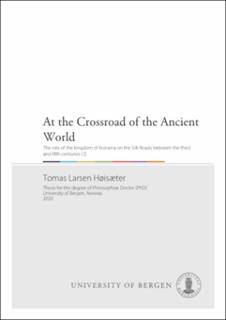At the Crossroad of the Ancient World : The role of the kingdom of Kroraina on the Silk Roads between the third and fifth centuries CE
Doctoral thesis

Åpne
Permanent lenke
https://hdl.handle.net/11250/2725620Utgivelsesdato
2020-12-04Metadata
Vis full innførselSammendrag
This dissertation sets out to study the Silk Road exchange network of late antiquity, seeking a framework for how this wide-reaching phenomenon should be understood. It proposes to do so by a novel bottom-up approach to the Silk Road, conducting a case study of the economic conditions and connections of the kingdom of Kroraina in the Southern Tarim Basin and analysing what role this kingdom might have played in shaping the Silk Road exchange network between the third and the fifth centuries CE. To do so, the study draws upon the uniquely rich source material available from the kingdom of Kroraina, including archaeological material, documents in both Chinese and Sogdian, but most importantly a large collection of 880 locally produced documents in Kharosthi.
Based on these sources, the case study explores various aspects of the economic landscape of Kroraina, considering the evidence for its economic system, the presence and role of long-distance exchange in the kingdom, and the networks in which its oases were situated. Having thus detailed the Krorainan economy, the study turned to questions concerning the Silk Roads, looking first at the form Silk Road exchange might have taken in the Southern Tarim Basin and, secondly, to what extent the kingdoms of the Southern Tarim Basin played a role in facilitating and driving this exchange.
The study concludes that movement and exchange along the Silk Roads through the Southern Tarim Basin in late antiquity was a complex phenomenon, driven by a wide variety of structures, actors, and factors. The study does however show that the kingdom of Kroraina played a crucial role in driving and maintaining this exchange network, both as a consumer of imported goods and as a provider of fundamental infrastructure for movement and trade. Based on these findings the dissertation ends by proposing a layered network model for the Silk Roads network, one that seeks to encompass the full complexity of the Silk Roads network and at the same time emphasise the role of smaller polities in this system.